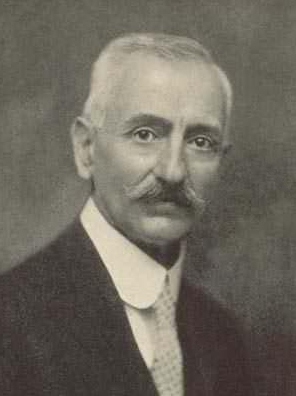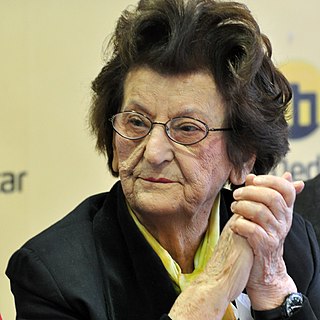
Aleksa Šantić was a poet from Bosnia and Herzegovina. His poetry reflecting both the urban culture of the region. The most common themes of his poems are social injustice, nostalgic love, and the unity of the South Slavs. He was the editor-in-chief of the magazine Zora (1896–1901). Šantić was one of the leading persons of Serbian literary and national movement in Mostar. In 1914 Šantić became a member of the Serbian Royal Academy.

Danilo I Petrović-Njegoš was the Metropolitan of Cetinje between 1697 and 1735, and the founder of the House of Petrović-Njegoš, which ruled Montenegro from 1697 to 1918.
Stefan Crnojević, known as Stefanica was the Lord of Zeta between 1451 and 1465. Until 1441, as a knyaz he was one of many governors in Upper Zeta, which at that time was a province of the Serbian Despotate. He then aligned himself with the Bosnian duke, Stefan Vukčić Kosača, and remained his vassal until 1444 when he accepted Venetian suzerainty. In Venetian–held Lezhë, on 2 March 1444, Stefan and his sons forged an alliance with several noblemen from Albania, led by Skanderbeg, known as the League of Lezhë. In 1448 he returned under suzerainty of Serbian Despot Đurađ Branković. In 1451, Stefan took over the leadership of the Crnojević family and became the ruler of a large part of Zeta, hence the title Gospodar Zetski.

The House of Kosača, somewhere Kosačić, was a Bosnian medieval noble family which ruled over parts of modern-day Bosnia and Herzegovina, Croatia, Montenegro, and Serbia between the 14th century and the 15th century. The land they controlled was known as Humska zemlja, roughly corresponding to modern region of Herzegovina, which itself was derived from the title "Herzog", which Stjepan Vukčić Kosača adopted in 1448., with latin title "Dux Sancti Sabbae". Besides Hum, they ruled parts of Dalmatia and Rascia. They were vassals to several states, including the Kingdom of Bosnia and Ottoman Empire. Historians think the Kosača family is part of the Kőszegi family, but there is a lack of evidence for this claim.
The religious confession of the Kosača family is uncertain. They were in contact with the Eastern Orthodox Church, the Church of Bosnia, the Roman Catholic Church and Islam. During the fall of the Bosnian Kingdom, the "Kosače" split into three branches: Venetian, Dalmatian and Ottoman. From then onward, these branches became accepting of the Roman Catholic faith, in the first two cases, and of Islam in the third.
The Operation Kopaonik was a large-scale Axis offensive launched against the Mihailović's Chetniks in Axis occupied Yugoslavia during World War II. The operation was inspired by Heinrich Himmler who believed that the annihilation of Draža Mihailović and his forces was a basis for a success in Serbia and South East Europe. Since Dragutin Keserović and his Rasina Corps was probably the most active commander of Mihailovićs Chetniks in Serbia, the newly established 7th SS Volunteer Mountain Division Prinz Eugen was engaged to participate in Operation Kopaonik to destroy Keserović and Chetnik unit under his command.

Paladino Gondola was a Ragusan diplomat and merchant, a member of noble Gondola noble family.
Jovan Grković, nicknamed Gapon (Гапон) was a former Serbian Orthodox monk who joined the Serb guerrilla (chetniks) in the Macedonian Struggle (1902–1912).
The Vulnetari ("volunteers") were a volunteer militia of Albanians from Kosovo set up in 1941 by Italian forces after the successful invasion of Yugoslavia. They served as an auxiliary force for civilian control and protection of villages.

Smilja Avramov was a Serbian academician, legal scholar, social activist and educator in international law. She was a member of the Senate of Republika Srpska from 1996 to 2009. Before she retired she was a Professor of International law at the Law Faculty at Belgrade University.
Djemo the Mountaineer is a popular legendary hero of Serbian epic poetry who is depicted as enemy of Kraljević Marko and brother of Musa Kesedžija. His figure might be based on an actual historical person. There are (disputed) claims that he was a member of Muzaka noble family from Albania or maybe the Ottoman soldier Jegen Osman Pasha. Some authors, such as Russian folklorist Khalansky, connected him with Svyatogor, which is also disputed by some other scholars.
Jelena Lazarević, also known, by marriages, as Jelena Balšić Hranić or Jelena Balšić or Jelena Kosača, was a medieval Serbian princess, daughter of Prince Lazar of Serbia and Princess Milica Nemanjic. She had a very strong personality and significantly influenced the way her husbands, first Đurađ II Balšić and second Sandalj Hranić Kosača, and her son Balša III governed their realms. Jelena encouraged them to resist Venetian encroachment on territory belonging to Zeta, the medieval Serbian state ruled by Đurađ II and then by Balša III after Đurađ II's death. She is also known as a writer in epistolary literature, particularly her correspondence with Nikon of Jerusalem, a monk in the Gorica monastery on Lake Skadar (Montenegro). Her three epistles are part of the Gorički zbornik, a medieval manuscript collection.

The First Scutari War was an armed conflict in 1405–1412 between Zeta and the Venetian Republic over Scutari and other former possessions of Zeta captured by Venice.
Old Rashko or Old man Raško was a Serbian storyteller and gusle player (guslar) known as one of the most important sources of the epic poetry recorded by Vuk Karadžić.
Petrič or Petrč or Petrić was a strategic military complex consisting of two late medieval fortresses in Nerodimlje Župa of the Kingdom of Serbia. The role of the main fortress Veliki Petrič and a smaller fortress Mali Petrič was to protect the court of the King of Serbia in Nerodimlja.
Vukac Hranić Kosača was powerful Bosnian magnate and nobleman from Kosača noble family with the title of knez, during the reigns of Tvrtko II, Stephen Ostoja, Stephen Ostojić and Tvrtko II again.
Mardarije Kornečanin was an Eastern Orthodox bishop in Montenegro and Primorje, serving as the Metropolitan of Cetinje from 1637 to 1659, under the jurisdiction of the Serbian Patriarchate of Peć. After 1640, he entered into negotiations with the Catholic Church, hoping to achieve political and military support through Church Union. He succeeded Metropolitan Rufim Njeguš, and was succeeded by Rufim Boljević.
Grdan was the vojvoda (duke) of the Nikšić nahija, part of the Sanjak of Herzegovina, who led several uprisings against the Ottomans in between 1596 and 1612, alongside Serbian Patriarch Jovan Kantul.
Damjan Ljubibratić, known as Damjan the Serb was a Serbian Orthodox monk and diplomat, the secretary of Patriarch Jovan Kantul.
Milan D. Kovačević was a Serbian teacher and activist. He has been described as one of the hardest working Serbian educational and national workers of the 19th century.
Abdulah "Avdo" Sumbul was Serb Muslim literature journal editor and national activist in Austrian annexed Bosnia and Herzegovina. Sumbul belonged to a group of Serb Muslims who were targeted as enemies by Austria Hungary and persecuted because of their ethnicity. He died in Austro-Hungarian concentration camp in Arad.




